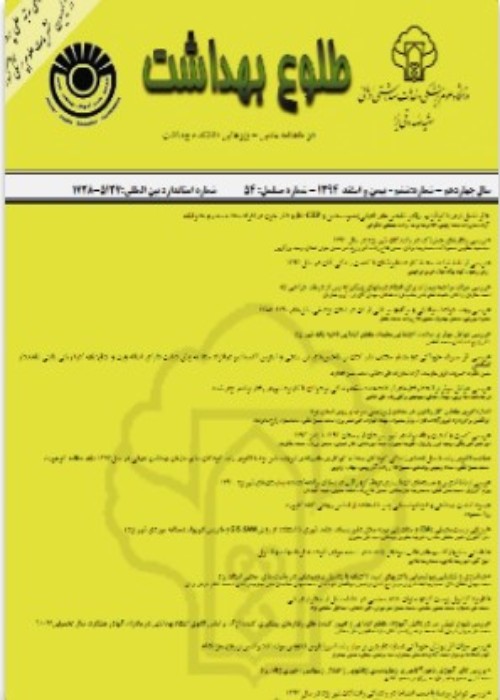Examining the Influential Factors in Adopting Lifestyle-promoting Behaviors in Adolescents Using Theory of Planned Behavior
Author(s):
Abstract:
Introduction
Unhealthy life style causes health risks as well as non-communicative diseases in the adulthood. Theory- based educational needs assessment before-intervention can be introduced as a basis among adolescents regarding education planning in lifestyle promotion. Therefore, this study aimed to examine the influential factors in adopting lifestyle-promoting behaviors in adolescents using theory of planned behavior.Methods
In this cross-sectional analytic study, a sample of 175 students, aged 12-15 years, were selected via multistage random sampling. In order to glean the study data, a questionnaire was utilized based on constructs of planned behavior theory with regard to adolescent's life style. The study data were analyzed using SPSS software (ver. 20) via Pearson correlation, independent t-test and multi factorial regression.Results
The student's mean age was reported 13.5, 0.9 years. Quality of life decreased with increasing age of the students and their father's education level. No association was found between intention and behavior in healthy eating (P= 0.438) as well as smoking and alcohol rejection (p= 0.256). Healthy eating behavior (B=0.638) and intention (B=0.268) were most predicted by attitude. Intention in physical activity was most predicted by perceived behavioral control (B=0.244) and behavior (B=0.424) was most predicted by the subjective norms. Regarding stress management, intention was most predicted by subjective norms (B=0.455) and behavior was most predicted by the perceived behavioral control (B=0.767). In smoking and alcohol rejection, attitude (B=0.829) showed a strong association with intention and perceived behavioral control (B=0.311) revealed a strong relationship in regard with behavior.Conclustion: Lack of association between intention and behavior demonstrated that demographic variables, except for intention, may affect behavior in adolescents. Educational interventions focusing on perceived behavioral control construct seem to be an important way to achieve the healthy behavior. Since physical activity behavior was directly affected by the subjective norms, promoting exercise behaviors in the age groups will be more successful with the family cooperation.
Keywords:
Language:
Persian
Published:
Tolooe Behdasht, Volume:14 Issue: 6, 2016
Pages:
79 to 93
magiran.com/p1520547
دانلود و مطالعه متن این مقاله با یکی از روشهای زیر امکان پذیر است:
اشتراک شخصی
با عضویت و پرداخت آنلاین حق اشتراک یکساله به مبلغ 1,390,000ريال میتوانید 70 عنوان مطلب دانلود کنید!
اشتراک سازمانی
به کتابخانه دانشگاه یا محل کار خود پیشنهاد کنید تا اشتراک سازمانی این پایگاه را برای دسترسی نامحدود همه کاربران به متن مطالب تهیه نمایند!
توجه!
- حق عضویت دریافتی صرف حمایت از نشریات عضو و نگهداری، تکمیل و توسعه مگیران میشود.
- پرداخت حق اشتراک و دانلود مقالات اجازه بازنشر آن در سایر رسانههای چاپی و دیجیتال را به کاربر نمیدهد.
In order to view content subscription is required
Personal subscription
Subscribe magiran.com for 70 € euros via PayPal and download 70 articles during a year.
Organization subscription
Please contact us to subscribe your university or library for unlimited access!



